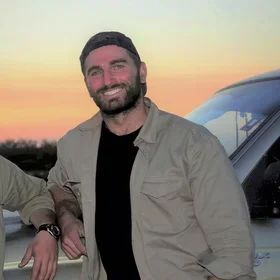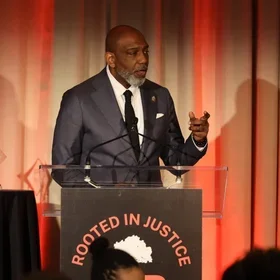Mark Whitlock is a faculty member in Columbia University's Negotiation and Conflict Resolution graduate program where he teaches in the Capstone Thesis seminars. Whitlock’s research and practice examines identity-based political violence and decision-making with a particular interest in operational early warning and response (EWR). He previously taught in New York University’s Global Affairs Program where he designed the courses Statebuilding and International Policy and Prevention of Mass Killing.
We spoke with him via email about his research on genocide, his work with the Africa Task Force, and his class for the Negotiation and Conflict Resolution graduate program.
Can you tell me about your work with the Africa Task Force?
I am the Research Coordinator for the Africa Task Force (ATF) on the Prevention of Mass Atrocities. The ATF is an 18-month initiative of the Budapest Centre for the International Prevention of Genocide and Mass Atrocities to map current atrocity prevention capabilities of regional organizations in Africa.
What’s the approach of the task force?
To maximize value to policymakers and other decision-makers in Africa, the Task Force utilizes future “plausible scenarios” as a guiding tool for the Final Report. In the first phase of the research in 2015 five Senior Researchers from Africa conducted desk-based research. This phase leveraged an existing case of mass atrocities within each regional organization and included a gap analysis of the needs emerging from that case history. The Task Force shared the results of the first round of research with regional representatives during the second phase, smaller workshops convened at the headquarters of the Regional and Sub-Regional Organizations with local experts and stakeholders. During these workshops researchers and Task Force members collected data from participants and exchanged views on the results of the desk-based research. In the third and final phase, the Task Force is currently analyzing the data and summarizing the outcome of the research, consultations and interviews. The Report will be released in June 2016. The Report will then be presented to the regional and sub-regional organizations, as well as to the United Nations, World Bank, European Union, and regional development banks in Africa.
What are the objectives of the Africa Task Force?
- Conduct a review of capacities and needs of five regional institutions in Africa (AU, ECOWAS, IGAD, ICGLR, and SADC) to prevent mass atrocities including war crimes, crimes against humanity, genocide and ethnic cleansing;
- Encourage a ‘mass atrocities lens’ when assessing and responding to security risks and preparing and implementing development plans;
- Synthesize lessons from the continental and global ‘state of the art’ to strengthen African technical and operational capacity in early warning and response (EWR).
- Enhance national and local capacities in Africa and improve the interaction with international actors and donors to prevent mass atrocities;
- Promote dialogue as a tool for mass atrocities prevention among members of regional and sub-regional organizations and at national and community levels;
- Raise awareness and translate general commitment of African States to atrocity prevention into practice by making prevention of mass atrocity crimes a priority of their policies.
Your research explores identity-based political violence. Can you briefly describe your research and practice?
My research and practice explores identity-based political violence with a particular interest in operational early warning and response, and the role of networks. I use simulation (Table-top and web-based) with learners to explore decision-making, practice perspective adoption, and illuminate the role of concepts including empathy and emotion in conflict situations. As a student at SIPA a decade ago, I co-developed (with former CCNMTL partners) a deterministic atrocity early warning and prevention simulation based upon case history that has been deployed in the classroom and the field. I am currently co-developing a web-based simulation with NECR Faculty that could serve as a diagnostic tool for students at stages of their development within the NECR program. The web-based environment simulates a conflict between Jews and Arabs in Ramla, Israel and is in the second design iteration.
You've worked in conflict resolution in many regions, including southeast Asia and the Middle East. Tell me about your fieldwork.
I've conducted research and trainings in the U.S., Europe, Africa, and the Middle East that explore many of the aforementioned themes regarding identity and conflict. Some examples over the last decade include:
- Trainings of decision-makers within Visegrad Group governments in Central Europe (Atrocity Prevention).
- Trainings of professional conflict analysts and decision-makers within ECOWAS in West Africa.
- Trainings of visiting African parliamentarians and human rights personalities - US State Department (Conflict Prevention)
- Design of a Peacebuilding curriculum for Lebanese students exploring the role of identity during the Lebanese Civil War - Byblos, Lebanon
- Visit to Ramla, Israel with NECR Faculty to collect data for conflict simulation design.
- Conducted focus groups with leadership of African regional organizations (Continent-wide) for the African Task Force on the Prevention of Mass Atrocities.
My current research uses qualitative methods to explore the politics and psychology of decision-making in the context of organizational early action/response.
You teach Networking and Sustainability. What is your class like, and how does it fit into the goals of the NECR program?
Networking and Sustainability (K5300) comprises the final third of the NECR Capstone Seminar, and explores the role of networks in sustaining positive change. Students use scenarios, role-play and case studies to build upon and practice skills necessary to take a leadership role in their conflict resolution related-work beyond their experience at the Academy. Bridging this theory to practice gap is a primary goal of the NECR program, and drives the content and pedagogy of my course. The objectives of the networking section are to examine (and leverage) the role of networks for the purposes of sustaining conflict resolution outcomes and impact. Students are encouraged to analyze the structure and dynamics of contemporary conflict networks (from an office dispute between co-workers to inter-religious conflict in the Moluccas), identify theories in the field to support assessments and inform sustainability strategies, and identify measures to sustain the impact of change emerging from their proposed interventions.
Learn more about the Negotiation and Conflict Resolution graduate program.


